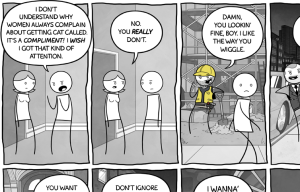Originally posted on Role/Reboot and cross-posted here with their permission.
The language we use tells a powerful story about a woman’s overriding need to be a mother.
Our culture talks about the “maternal clock,” going “baby crazy,” and having a “maternal instinct,” for instance.
For a lot of women (myself included), these things were very real, but when they become a stereotype applied to all women, it’s damaging and limiting in a number of ways.
When I first realized that pregnancy was just not happening for my husband and me, I was in deep denial. I played a lot of “Fate wants me to move to X before I have kids” or “oh, the universe must want me to get my graduate degree first.”
It took me a long time to utter the word: Infertility.
It was pure, unadulterated hell. I wouldn’t wish it on my worst enemy. I’m not just saying that – may Anne Coulter, Michelle Bachmann, and that girl at work who stole my parking spot never have to experience infertility.
Even though I could write reams about the awful things people say to infertile women, I have to admit that I also found many places of comfort and support.
I saw a therapist who specialized in infertility (who was, irony of ironies, pregnant with twins the day I met her). I joined wonderful online communities of infertiles. I went to a support group at my church called “Barren Land” (how depressing is that?). And I started a blog, which has been the most enriching experience of my life.
You see, if women are ticking, crazy, and instinctively all about motherhood, then it isn’t that much of a stretch to realize that infertility is painful for women.
But men? Not so much.
Our society says that men have to be dragged into parenthood with their nagging, clock-ticking wife badgering them about boxer shorts and staying out of the sauna at the gym. Men only vaguely want kids if they want them at all. If it doesn’t happen then they just get to golf more, right?
So, here’s my big secret: I’m not infertile.
Gasp! I know, I blog about being infertile, so that’s kind of a big shoe to drop. I mean, I do say that “I suffer from infertility” because I did live all the years of testing and loss, but medically, my pipes are fine. Our infertility is “Male Factor.”
I remember waiting for my husband’s semen analysis results with trepidation. I felt sorry for him anyway. At least my testing didn’t require – um – stimulation.
But I also hoped that it was me who was the problem in the same way you always wish adversity on yourself over your loved ones.
When the results came back – sperm count, normal; motility, 0% – it took me thirty minutes to stop crying before I could call him to tell him the news. He took it with stoic strength like society had taught him to take any setback.
I saw my husband take “you’re shooting blanks” jokes, “are you sure you’re doing it right?” and “I can knock ‘er up if you want” comments for close to a decade.
He also had to hear people say “well you’re fertile” to me in front of him. Like I’m going to suddenly realize, “Oh! I never thought of it that way! I’ll just throw him out and go get a real man!”
When we discussed donor sperm (a much cheaper option than adoption for those with male factor only), he appeared to not be fazed by the fact that we were wading through applications of other men to father his kids – that his kids wouldn’t have his genes. He heroically (and correctly) pointed out that genetics does not make one a dad.
Even after we conceived through IVF (in vitro fertilization), he heard comments like “your boys did it!” and “you got some baby makers after all.” He laughed and changed the subject.
When I got pregnant a second time through FET (frozen embryo transfer) with twin boys, this somehow was further proof of his virility. Not only did his “boys” make it, but they made two more testosterone producers, so they must be really manly.
You would think he was completely unaffected by our struggle to make a family. And what choice did he have?
If he had lamented the pain of infertility, who would have comforted him? What services were available to help him cope with each cycle of drugs, shots, and failure?
There was no online forum where men congregated to wish each other “baby dust!”
But I saw his silent pain. He wasn’t immune to the thought that he was infertile.
He didn’t feel ambivalent about not seeing his eyes or hair in an offspring. He certainly wasn’t without grief each time I fell into tears after a cycle at a negative test. I know he felt more than once that it was “his fault” I didn’t have a baby.
When we were at family functions seeing our younger cousins and siblings with their kids, we’d make eye contact from across the room, both of us acknowledging and then hiding our pain.
Infertility hurts men, too.
It wasn’t at all surprising to me that a recent study found that men are more likely than women to be depressed over childlessness. The study conducted in the UK looked at childless men (not necessarily infertile men) and found that despite equal desires for parenthood, “Of the men who wanted children, 50 percent experienced isolation because they did not have [children], compared with 27 percent of women; 38 percent experienced depression, compared with 27 percent of women.”
Is the isolation and depression a function of some deeper, hidden male paternal instinct that is biologically driven, or are men more likely to feel isolated and depressed about their childlessness because there are no spaces where men can receive support for their feelings?
Infertility is not a battle of the worst off or a race to the bottom of despair. Whether men or women hurt more is irrelevant.
The fact is that the cultural narrative of women as mothers-in-waiting makes it acceptable and better understood when the wait drags on. Men, on the other hand, have a cultural narrative that says kids are fun but optional, and “real men” have aggressive, uber-sperm so potent it makes babies from across the room.
Both narratives are bad for men, women, and children.
We can change the narrative.
We can stop making assumptions about men’s’ (and women’s) desire for or feelings around children. We can make spaces – in organizations and in our own language – for men (and women) to be honest about their feelings on parenthood. We can stop passing judgment on what others “should” do.
This will help both men and women.
Men will be able to have a more authentic view on parenthood, which will help build respect for fathers as more than babysitters to their children. This in turn can take some of the societal pressure off of women to be the primary person judged for their sacrifice or lack thereof around raising kids.
And when men and women are seen as equal partners in parenting, then the extreme taboo of women who want to remain childless is lifted.
The best part? When parenthood is thoughtfully chosen instead of being done through obligation or cultural coercion, then children will benefit from parents who are conscientious and fully present in the parenting role. This will produce happier, more productive people.
I often say that one of the blessings of infertility is being so endlessly grateful for my kids.
When parenting gets hard (and it does!), we can take a deep breath and remember the alternative of childlessness. By the time I got pregnant – nine long years after we ditched the birth control – I had no doubt that my husband was as committed to parenting as I was.
I think the fact that we had broken down the narrative that I was “baby crazy” and he was “just along for the ride” has made a huge difference in our relationship to each other and with our kids.
When we break men and women out of culturally limiting roles, everyone can flourish.
Want to discuss this further? Login to our online forum and start a post! If you’re not already registered as a forum user, please register first here.
Paige Lucas-Stannard is a Parenting Writer and Educator at Everyday Feminism. She’s a former NASA research librarian happy to be home raising her 3 IVF babies after nearly a decade of infertility. She blogs about infertility, parenting, and women’s issues at Baby Dust Diaries as well as being the founder of the gentle discipline siteParentingGently.com and co-founder of the breastfeeding rights siteNursingFreedom.org. She likes to cook and sew and has, in general, become her mother. Happily. Follow her on Twitter @babydust.. Read her articles here.
Search our 3000+ articles!
Read our articles about:
Our online racial justice training
Used by hundreds of universities, non-profits, and businesses.
Click to learn more





















